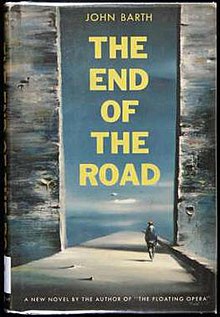
The End of the Road is the second novel by American writer John Barth, published first in 1958, and then in a revised edition in 1967. The irony-laden black comedy's protagonist Jacob Horner suffers from a nihilistic paralysis he calls "cosmopsis"—an inability to choose a course of action from all possibilities. As part of a schedule of unorthodox therapies, Horner's nameless Doctor has him take a teaching job at a local teachers' college. There Horner befriends the super-rational Joe Morgan and his wife Rennie. The trio become entangled in a love triangle, with tragic results. The story deals with issues controversial at the time, such as sexuality, racial segregation, and abortion.
Barth and his critics often pair the novel with its predecessor, The Floating Opera (1956); both were written in 1955, and they are available together in a one-volume edition. Both are philosophical novels; The End of the Road continues with the conclusions about absolute values made by the protagonist of The Floating Opera, and takes these ideas "to the end of the road".[2] Barth wrote both novels in a realistic mode, in contrast to Barth's better-known metafictional, fabulist, and postmodern works from the 1960s and later, such as Lost in the Funhouse (1968) and LETTERS (1979).
Critics have been divided over whether Barth identified with the book's protagonist, who retreats from emotion and human relations through language and intellectual analysis; Jake prefers to keep even his sexual relations impersonal. Language is presented as a distortion of experience, yet nevertheless unavoidable. In his later novels Barth forefronted the artifice in his writing, beginning with The Sot-Weed Factor (1960), a work Barth conceived as the last of a "loose trilogy of novels".
A 1970 film loosely based on the novel stars James Earl Jones, Stacy Keach and Harris Yulin in their earliest feature roles. It was rated X, in part because of a graphic abortion scene.
- ^ The End of the Road: John Barth, Jacket Painting By Robert Watson.: Amazon.com: Books Retrieved 2013-09-19.
- ^ Meindl 1996, p. 185.